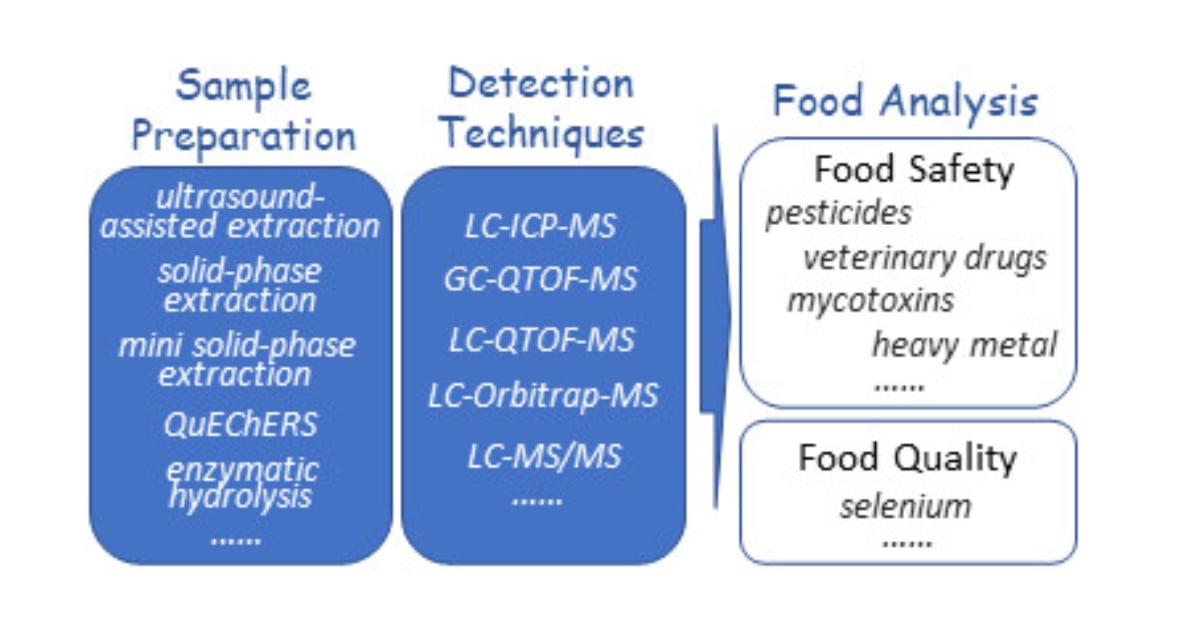- 2.7Impact Factor
- 4.5CiteScore
- 16 daysTime to First Decision
Advances of Accurate Quantification Methods in Food Analysis
This special issue belongs to the section “Analysis of Food and Beverages“.
Special Issue Information
Dear Colleagues,
Food safety and quality always represent an important topic. The accurate quantification of related components (pesticides and veterinary drugs, mycotoxins, persistent organic pollutants, nutrient content, etc.) plays key roles in the guarantee of food safety and quality. Concerning food analysis, sample pretreatment aims to enrich target analytes and remove matrix components (lipids, proteins, salts, acids, pigments, etc.). New extraction or purification sorbents provide high specificity and efficiency for the targets. Combined strategies exhibit excellent performance in lowering matrix effects. Afterwards, detection techniques (chromatography, mass spectrometry, nuclear magnetic resonance and their tandom techniques) provide the final quantification results. Some statistical strategies show great potential in origin traceability, authenticity or adulteration.
This Special Issue welcomes any developments in novel sample pretreatment, detection techniques or statistical strategies to realize the accurate quantification of food components.
Dr. Xianjiang Li
Dr. Rui Weng
Guest Editors
Manuscript Submission Information
Manuscripts should be submitted online at www.mdpi.com by registering and logging in to this website. Once you are registered, click here to go to the submission form. Manuscripts can be submitted until the deadline. All submissions that pass pre-check are peer-reviewed. Accepted papers will be published continuously in the journal (as soon as accepted) and will be listed together on the special issue website. Research articles, review articles as well as short communications are invited. For planned papers, a title and short abstract (about 250 words) can be sent to the Editorial Office for assessment.
Submitted manuscripts should not have been published previously, nor be under consideration for publication elsewhere (except conference proceedings papers). All manuscripts are thoroughly refereed through a single-blind peer-review process. A guide for authors and other relevant information for submission of manuscripts is available on the Instructions for Authors page. Separations is an international peer-reviewed open access monthly journal published by MDPI.
Please visit the Instructions for Authors page before submitting a manuscript. The Article Processing Charge (APC) for publication in this open access journal is 2600 CHF (Swiss Francs). Submitted papers should be well formatted and use good English. Authors may use MDPI's English editing service prior to publication or during author revisions.
Keywords
- sample pretreatment
- GC-MS
- LC-MS
- qNMR
- statistical strategy
- pesticides and veterinary drugs
- mycotoxin
- persistent organic pollutants
- nutrient content

Benefits of Publishing in a Special Issue
- Ease of navigation: Grouping papers by topic helps scholars navigate broad scope journals more efficiently.
- Greater discoverability: Special Issues support the reach and impact of scientific research. Articles in Special Issues are more discoverable and cited more frequently.
- Expansion of research network: Special Issues facilitate connections among authors, fostering scientific collaborations.
- External promotion: Articles in Special Issues are often promoted through the journal's social media, increasing their visibility.
- Reprint: MDPI Books provides the opportunity to republish successful Special Issues in book format, both online and in print.


